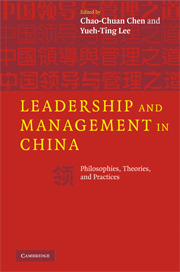Book contents
- Frontmatter
- Contents
- List of figures
- List of tables
- List of contributors
- Preface
- Acknowledgments
- Introduction: The diversity and dynamism of Chinese philosophies on leadership
- Part I The Confucian foundations
- Part II Alternative traditional Chinese leadership philosophies
- Part III Modern Chinese leadership theories and practices
- 6 Paternalistic leadership in Chinese organizations: research progress and future research directions
- 7 The leadership theories and practices of Mao Zedong and Deng Xiaoping
- 8 Chinese traditions and Western theories: influences on business leaders in China
- 9 Linking Chinese leadership theory and practice to the world: leadership secrets of the Middle Kingdom
- Index
- References
7 - The leadership theories and practices of Mao Zedong and Deng Xiaoping
Published online by Cambridge University Press: 14 May 2010
- Frontmatter
- Contents
- List of figures
- List of tables
- List of contributors
- Preface
- Acknowledgments
- Introduction: The diversity and dynamism of Chinese philosophies on leadership
- Part I The Confucian foundations
- Part II Alternative traditional Chinese leadership philosophies
- Part III Modern Chinese leadership theories and practices
- 6 Paternalistic leadership in Chinese organizations: research progress and future research directions
- 7 The leadership theories and practices of Mao Zedong and Deng Xiaoping
- 8 Chinese traditions and Western theories: influences on business leaders in China
- 9 Linking Chinese leadership theory and practice to the world: leadership secrets of the Middle Kingdom
- Index
- References
Summary
No one in the history of the People's Republic of China (PRC) could replace Mao Zedong (or Mao Tse-tung) and Deng Xiaoping, the former mainly remembered as the founding father of the Republic, and the latter, as the architect of China's economic reforms. Studies of Chinese leadership theory and practice cannot afford to ignore these two figures. Investigation of the distinct leadership theories and practices of these two individuals will enrich the understanding of leadership from a global perspective.
This chapter gives brief biographies of Mao Zedong and Deng Xiaoping, explains their major leadership theories, philosophies, and practices, and compares their distinct leadership styles and personalities. In synopsis, Mao in his leadership philosophy believed in “seeking truth from facts,” the “analytical dialectics of contradiction,” and “serving the people.” Mao's leadership practice is largely one of the “mass line” and “democratic centralism.” Deng, however, believed in reformism and pragmatism in his leadership philosophy. To fulfill his pragmatic reforms, Deng practiced experimentalism and gradualism as his instrumentality. Despite the important similarities in their thoughts on leadership, Mao and Deng seemed to contrast sharply in their leadership methods and styles. Mao was more idealistic and holistic, and a visionary on nationalism; Deng, in contrast, was more realistic, details-oriented, and a visionary on economic development. It is hoped that these introductions to Mao and Deng will contribute to a broader understanding of leadership theory and practice from a global perspective.
- Type
- Chapter
- Information
- Leadership and Management in ChinaPhilosophies, Theories, and Practices, pp. 206 - 238Publisher: Cambridge University PressPrint publication year: 2008
References
- 1
- Cited by



